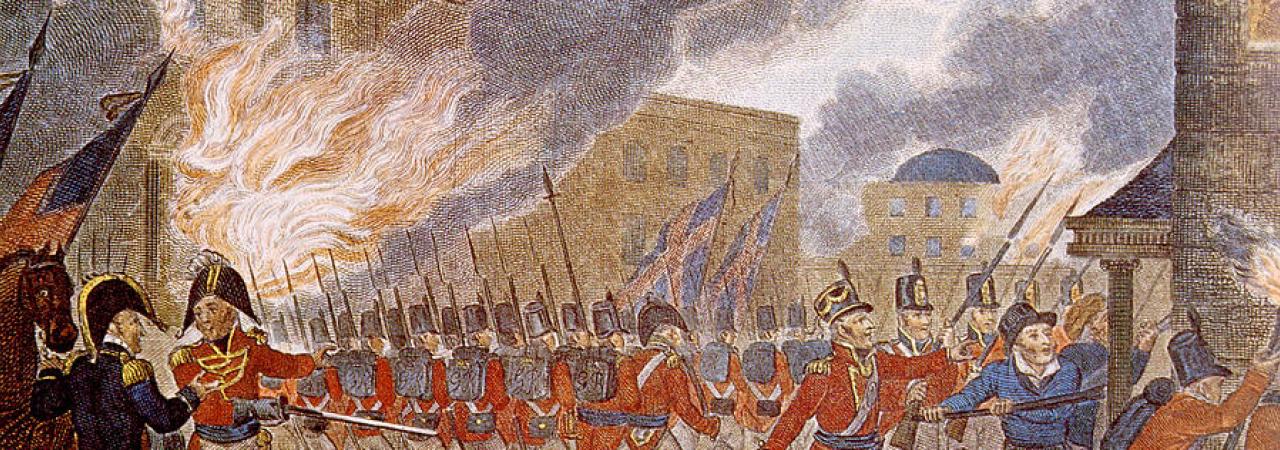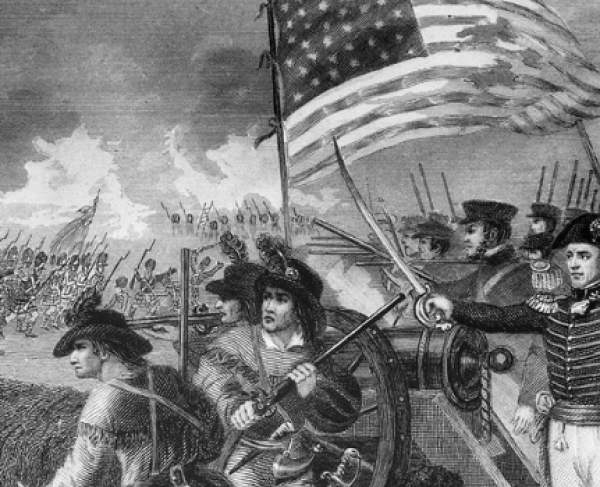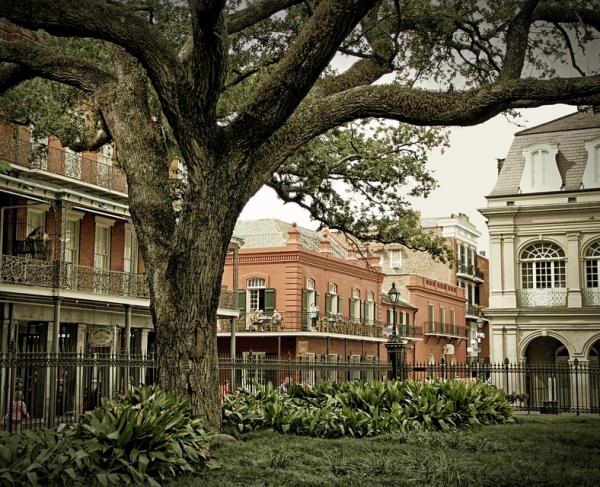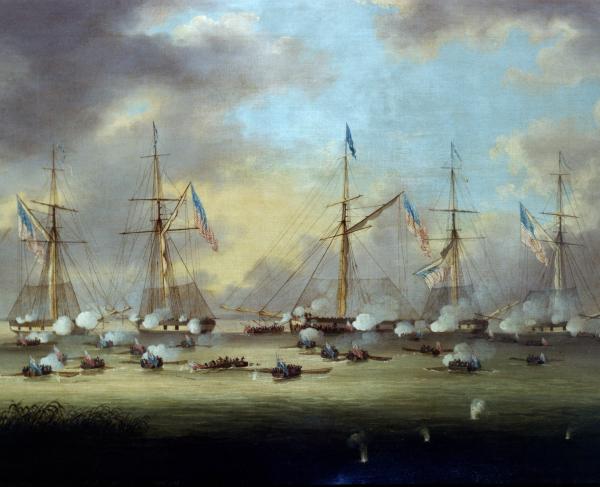War of 1812 Timeline

This illustration is from the 1816 book, The History of England, from the Earliest Periods, Volume 1 by Paul M. Rapin de Thoyras.
Explore our timeline of the War of 1812 and learn about the important events and battles that happened throughout this period of American history – from the Battle of Tippecanoe to the signing of the Treaty of Ghent. View the American Revolution and Civil War timelines.
1793
- February 1 – France declares war on Great Britain
1794
- August 20 – General Anthony Wayne defeats a Native American confederation at the Battle of Fallen Timbers, paving the way for the settlement of present-day Ohio
1804
- April 30 – The Louisiana Purchase is finalized, adding more than 800,000 square miles to the western frontier of the United States
- December 4 – Napoleon is crowned Emperor of France following a coup d'etat
1806
- April 18 - Non- Importation Act passed
- November 21 – Napoleon issues the Berlin Decrees
1807
- June 22 – HMS Leopard fires on the USS Chesapeake
- November 11 – Great Britain passes the 1807 Orders in Council, restricting international trade with France
- December 22 – Embargo Act Passed
1809
- March 4 – James Madison is sworn in as the 4th President of the United States.
1811
- May 16 – The American frigate USS President fires on the British sloop HMS Little Belt
- October 9 – Major General Isaac Brock is appointed Administrator of Upper Canada
- November 11 – Battle of Tippecanoe
1812
- June 18 – The United States declares war on Great Britain
- June 22 – A mob in Baltimore destroys the printing offices of an anti-war newspaper
- July 12 – General William Hull invades Canada from Detroit
- July 17 – Fort Michilimackinac surrenders to British-Canadian forces
- August 5 – Skirmish near Brownstown, Michigan
- August 8 – General William Hull returns to Detroit
- August 15 – British forces bombard Detroit
- August 16 – General William Hull surrenders Detroit
- August 19 – The USS Constitution defeats the HMS Guerriere
- October 13 – British-Canadians win the Battle of Queenston Heights, Ontario
- November 27 – Skirmish at Fort Erie
- December 28 – William Henry Harrison formally resigns as Governor of Indiana Territory and takes the rank of Brigadier General.
- December 29 – USS Constitution defeats the HMS Java
1813
- January 9 – Great Britain declares war on the United States
- January 13 – John Armstrong replaces William Eustis as Secretary of War
- January 18 – American forces seize Frenchtown, Michigan
- January 22 – The Battle of River Raisin; roughly 40 to 60 American soldiers are killed in “The River Raisin Massacre”
- February 22 – Battle of Ogdensburg
- March 4 – James Madison inaugurated for the second term as President
- March 27 – Oliver Hazard Perry takes command of the flotilla at Lake Erie
- April 27 – Attack on York [modern today Toronto]; General Zebulon Pike is killed
- April 29 – Raid on Frenchtown, Maryland by a British flotilla under the command of Admiral George Cockburn
- May 1 – American forces evacuate York; Siege of Fort Meigs near modern-day Toledo Ohio begins
- May 3 – Royal Marines land and burn Havre de Grace, Maryland
- May 27 – Engagement at Fort George
- May 29 – Battle at Sackets Harbor
- June 1 – USS Chesapeake captured by the British frigate HMS Shannon; Captain James Lawrence dies days later
- June 6 – Engagement at Stoney Creek
- June 22 – Battle of Craney Island
- June 24 – Battle of Beaver Dams
- June 25 – Burning of Hampton, Virginia
- August 10 – Battle of St. Michaels
- August 30 – Attack on Fort Mims, Alabama
- September 10 – Battle of Lake Erie
- October 5 – Battle of the Thames; Tecumseh is killed
- October 7 – Andrew Jackson establishes camp at Fayetteville, TN to recruit American forces to combat the Creeks in Alabama
- October 26 – Engagement at Chateauguay
- November 11 – Battle of Crysler’s Farm
- November 29 – Battle of Autossee
- December 19 – Capture of Fort Niagara
1814
- March 19 – Winfield Scott is promoted to Brigadier General at the age of 27
- March 27 – Engagement at Horseshoe Bend
- April 4 – Napoleon abdicates and is exiled to Elba off the coast of Tuscany; Great Britain now turns its focus to the war in America
- July 3 – American troops under Major General Jacob Brown cross the Niagara River and capture Fort Erie
- July 5 – Battle of Chippawa
- July 22 – Treaty of Greenville
- July 25 – Battle of Lundy’s Lane, one of the fiercest battles of the war
- August 8 – Peace negotiations begin
- August 9 - Treaty of Fort Jackson
- August 9 – Stonington, CT raid begins
- August 12 – Stonington Raid Ends
- August 14 – General Robert Ross in command of a reinforcement consisting of 4,500 veteran British troops arrive at the Chesapeake Bay
- August 19 – British troops land at Benedict, Maryland
- August 24 – Battle of Bladensburg
- August 24 – Burning of Washington, D.C.
- August 27 – Abandonment of Fort Warburton
- August 28 – Alexandria Raid
- September 6 – Battle of Plattsburgh
- September 11 – Battle of Lake Champlain
- September 12 – Battle of North Point; General Robert Ross is killed
- September 13 – Bombardment of Fort McHenry
- September 14 – Francis Scott Key writes the first lines of the poem which would become “The Star-Spangled Banner”
- November 6 – Battle of Malcolm's Mills
- November 9 – Battle of Pensacola
- December 1 – Peace delegates reconvene at Ghent
- December 14 – Delegates to the Hartford Convention meet in Hartford, Connecticut
- December 24 – The Treaty of Ghent is signed
- December 28 – The Treaty of Ghent is ratified by the British
1815
- January 5 – The Hartford Convention concludes
- January 8 – The Battle of New Orleans; death of Edward Packenham
- February 16 – The United States Senate ratifies the Treaty of Ghent
- February 18 – The Treaty of Ghent is declared; the War of 1812 is over
- February 20 – USS Constitution engages the HMS Cyane and HMS Levant, not knowing the war was over
- April 6 – Seven American prisoners are killed and 32 wounded in the “Dartmoor Massacre” at Dartmoor Prison in Devon, England
- May 24 – Battle of the Sink Hole
Topic(s):
CalltoArms
Support Outdoor Classrooms at Seven Key Battlefields
We're launching interpretation of African American history at 7 key battlefields, located in 5 states, spanning 3 wars.
Related Battles
Battle Facts
Ontario | October 13, 1812
Result: United Kingdom Victory
Estimated Casualties
1,233
United States
1,105
1,105
United Kingdom
128
128
Battle Facts
Ohio | September 10, 1813
Result: United States Victory
Estimated Casualties
563
United States
123
123
United Kingdom
440
440
Battle Facts
Ontario | July 25, 1814
Result: Inconclusive
Estimated Casualties
1,731
United States
853
853
United Kingdom
878
878
Battle Facts
Maryland | August 24, 1814
Result: United Kingdom Victory
Estimated Casualties
450
United States
200
200
United Kingdom
250
250
Battle Facts
Maryland | September 13, 1814
Result: United States Victory
Estimated Casualties
29
United States
28
28
United Kingdom
1
1
Battle Facts
Louisiana | January 8, 1815
Result: United States Victory
Estimated Casualties
2,096
United States
62
62
United Kingdom
2,034
2,034


